With USAID support, law schools in Cauca, Colombia are promoting courses on land and property administration to respond to a growing need in human resources and expertise in land issues.
At 19 years old, it wasn’t long ago when Faisudy Pechene sat watching her parents farm their land to earn a living for her and her siblings in rural Piendamó, Cauca. The memory is imprinted on her mind, but so are memories of how her family and community suffered from the fear of being displaced due to an unfortunate mix of violence and the lack of formal tenure over the land they called theirs.
“Many of the farmers that I grew up with never had access to property services. Their land is not formalized, and they don’t have the knowledge about any of this,” says Pechene, a student in her fourth year of law school at the Universidad Cooperativa in Cauca’s capital, Popayan.
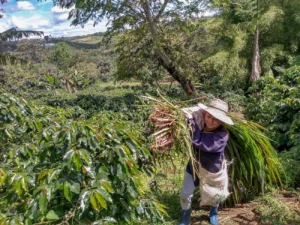
The Catedra Payán
Thanks to an initiative created by two Popayan-based universities, Unicomfacauca and Cooperativa de Colombia, and supported by the USAID-funded Land for Prosperity program, Pechene discovered an opportunity to acquire knowledge specific to land laws and policies in Colombia. The Catedra Payán is a new course required by the universities’ law departments that consists of 54 hours of coursework over six months on topics related to public policy in land administration, property formalization, multipurpose cadaster, and land rights for ethnic groups, among others.
“This course appeared at the right time to strengthen what I know about land laws and will prepare me to help people in need in Cauca,” says Pechene.
First Cohort of Land Experts
In September 2022, the first cohort of 25 law students finished the inaugural Catedra Payán, which kicked off in February. With USAID support, the universities aim to train at least two cohorts per year, and the second cohort, of which Pechene is a part, has already begun coursework.
Juan Diego Guerrero is one of the 25 graduates of the Payán Chair and is in his fourth year of law at Unicomfacauca, which means he is about to graduate with a degree and find a job. This diploma not only gives him more security when talking about land issues, but also represents an endorsement when looking for a job in the public sector or with an operator implementing massive land formalization initiatives.
“I am interested in working on a parcel sweep to help those people who do not know the status of their property,” Guerrero says. “Today there are not many professionals who really understand these topics.”
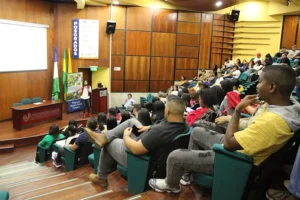
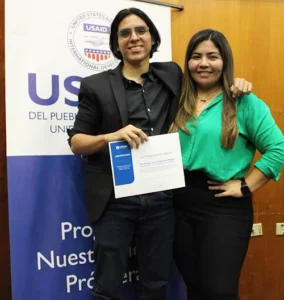
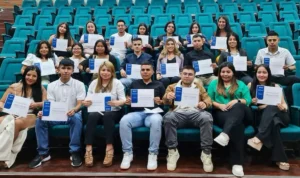
Above, the first cohort of 25 law students finished the Catedra Payán course on Colombian land laws and policies in September 2022. (Middle) Juan Diego Guerrero holds his course completion certification.
Mainstreaming Land Policies
In Colombia, the Unicomfacauca is becoming a pioneer in the development of this type of coursework. What was first an elective course is now a required course for its students, ensuring all law students learn about land issues while they pursue a law degree.
“In Colombia, land represents a long-standing social and cultural problem. With the Catedra Payán, we can strengthen our law students to address these issues and help to meet the objectives of the 2016 Peace Accords,” says Sebastián Toro, Dean of the Faculty of Humanities, Arts, Social Sciences and Education of Unicomfacauca.
The Catedra Payán course is proving to be a successful model that can be replicated by other universities in the country to strengthen the skills of law practitioners and widen a job field in public and private entities related to land administration and land rights advocacy, especially in Cauca where land conflicts persist after centuries of latifundismo and injustice.
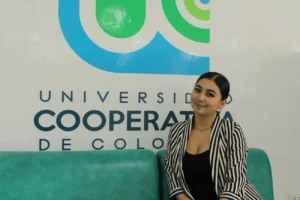
“My parents have always told me that if you can help someone you should do it,” says Feisudy Pechene, who will graduate with a law degree in 2023. It’s a motto that Faisudy treasures and that today defines her motivation and driving force to study law, become a lawyer, and dedicate her life to working on issues related to the land rights of underserved rural families in Colombia.
For the past eight years, USAID has provided direct support to the Colombian government to improve land administration in rural areas and implement massive land formalization initiatives to title thousands of rural parcels that families have lived on for years but have never legally owned. Santander de Quilichao, a municipality that lies at the center of Northern Cauca’s many ethnic conflicts over land, is one of the territories being prioritized by the Government to implement this strategy.
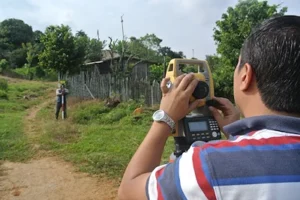
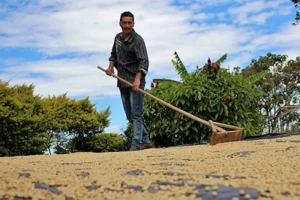
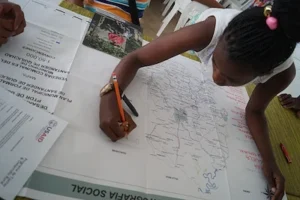
Footnotes
Photography by USAID Land for Prosperity
Cauca, Colombia
Cross posted from Land for Prosperity Exposure site

